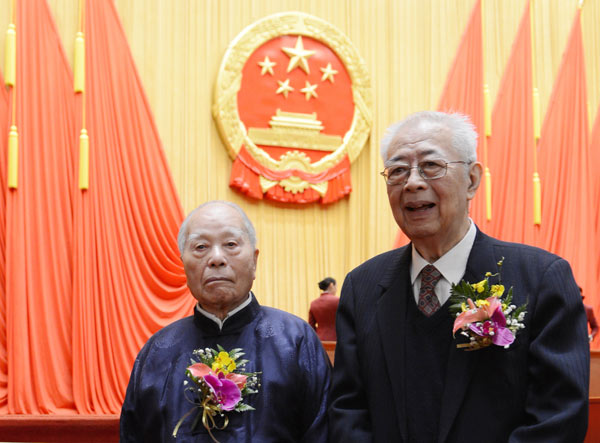 |
|
Nuclear weapons expert Cheng Kaijia (left) and physical chemist Zhang Cunhao, winners of this year’s top national science award, attend a grand ceremony in the Great Hall of the People in Beijing on Friday. ZHOU WEIHAI / FOR CHINA DAILY |
The pair, both members of the Chinese Academy of Sciences, were presented with certificates by President Xi Jinping at an annual ceremony honoring distinguished scientists and research achievements.
They each won an award of 5 million yuan ($826,000).
|
Meet the winners |
|
Zhang Cunhao, 85, is a renowned chemist, former president of the National Natural Science Foundation of China, member of the Chinese Academy of Sciences and a fellow of the Third World Academy of Science. Zhang graduated from Central University in Nanjing in 1947 before going to study in the United States, receiving a master’s degree in chemical engineering from the University of Michigan in 1950. His early research fields included catalysis, chemical engineering, chemical kinetics and frontier disciplines including the combustion of propellants and chemical lasers. In the 1970s, Zhang worked on chemical laser research and laser spectroscopy of excited molecules, in which he made major contributions. He won the National Natural Science Prize four times, as well as a number of other prizes. Cheng Kaijia, 95, is a well known physicist and nuclear science and technology pioneer in China. He graduated with a bachelor’s degree in physics from Zhejiang University in 1941. In 1946, Cheng studied at the University of Edinburgh in Britain, achieving a doctorate in 1948 before becoming a researcher in the UK. After returning to China in 1950, Cheng worked at Zhejiang University, Nanjing University, the Ninth Academy of Second Machinery Ministry and the Research Institute at China Nuclear Test Base, among others. He was elected a member of the Chinese Academy of Sciences in 1980. Since the 1990s, Cheng’s research has focused on material theory and high-power microwave technology. |
The nation's traditional growth pattern, mainly driven by investment, is difficult to sustain, Li said.
Eight foreign scientists from Italy, the United States, Germany, Russia and Canada won the International Science and Technology Cooperation Award.
Meanwhile, 313 scientific research projects received the 2013 State science and technology awards.
The award was given to the discovery of iron-based high temperature superconductors, a project conducted by scientists from the Institute of Physics under the Chinese Academy of Sciences and other institutions.
Superconductivity basically refers to the electrical resistance of a material suddenly being reduced to zero under certain circumstances, said Zhao Zhongxian, a superconductivity physicist and member of the Chinese Academy of Sciences.
Components made from superconductors can help to improve the accuracy of atomic clocks on satellites, accelerate central processing units on computers, and increase the precision of gyroscopes on navigational devices.
"Many excellent scientists contributed to the research on superconductivity in China, and it is hard to tell whether we would have reached this point without any one of them," Zhao said. "In China, we have a good research tradition on superconductivity, and we have talent of all ages. China has become a rising power in condensed matter physics," he added.
In 2009, the research and compilation of Flora of China, a scientific publication aimed at describing plants native to China, won first prize in the State Natural Sciences Award.
The project marked collaborative efforts by Chinese scientists to publish the first modern English-language account of some 31,000 important plants and 7,500 species of trees and shrubs.
Xinhua contributed to this story
|
|
|
|
|
|
|
|
